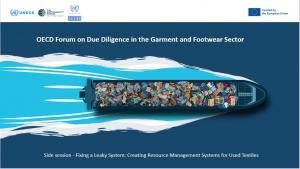The global market for second-hand clothing has been multiplied by seven in the last 4 decades. The practice of exporting second-hand clothing from developed to developing countries has been intensified by the boost of the fast fashion industry, impacting the environment, social and human rights in importing countries.
To address this issue, UNECE and UNECLAC, in collaboration with the Ellen MacArthur Foundation held the virtual side session “Fixing a leaky system: creating resource management systems for used textiles” at the 2024 OECD Forum on Due Diligence in the Garment and Footwear Sector.
The meeting brought together representatives of governments, businesses, trade unions, civil society and academia to discuss ways to find new coordinated strategies, including a multilevel approach involving exporting and importing countries, and an Extended Producer Responsibility (EPR) system holding producers responsible.
Over 400 participants discussed the findings of a UNECE and UNECLAC study and current trends on reuse, recycling and disposal pathways, as well as possible solutions, on how this EPR for textiles can produce a scaled infrastructure for collection, sorting, reuse, and recycling, ultimately contributing to the development of circular economy solutions across borders.
Additionally, UNECE’s Team of Specialists organized a closed-door meeting to discuss challenges in scaling up transparency and traceability with respect to environmental, social and corporate governance (ESG): “Transparency at scale for due diligence and ESG compliance in textiles- OECD Forum on Due Diligence in the Garment and Footwear Sector”.
Another session where different actors from different approaches face common challenges, namely policy makers, cooperation agencies, brands, civil society organizations, industry representatives and technology providers acknowledged challenges in terms of data collection, interoperability or the need to better digitize transactions to enable interoperability.
The meeting will be the starting point for future discussions on possible collaborative initiatives to design joint solutions. After the meeting it has become clear there is a need to align on the core and better digitize transactions to enable interoperability.
Outcomes of this and other initiatives undertaken by UNECE under the Sustainability Pledge are feeding international standards and norms like the European Commission’s proposal for a Directive on Corporate Sustainability Due Diligence.


